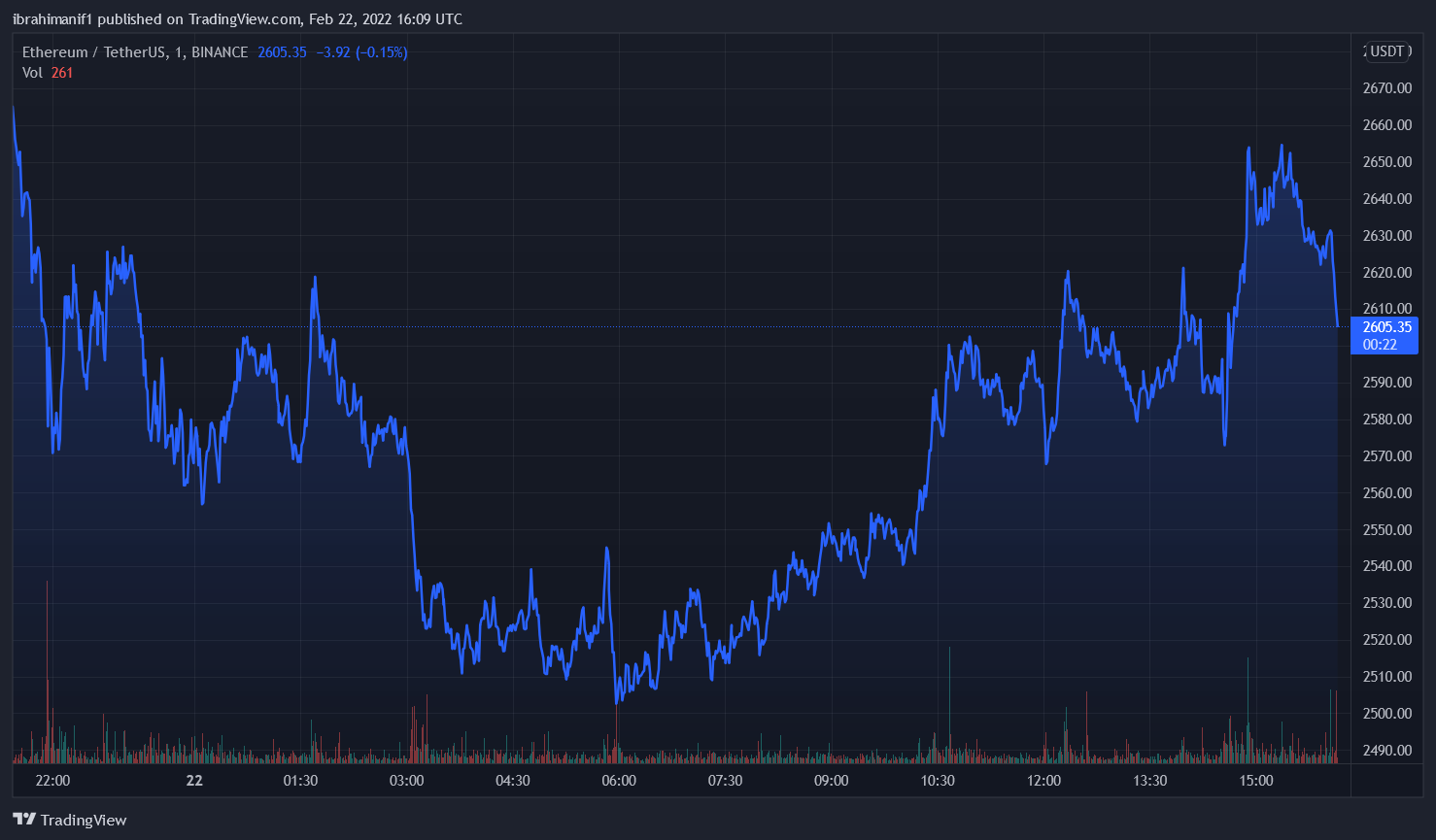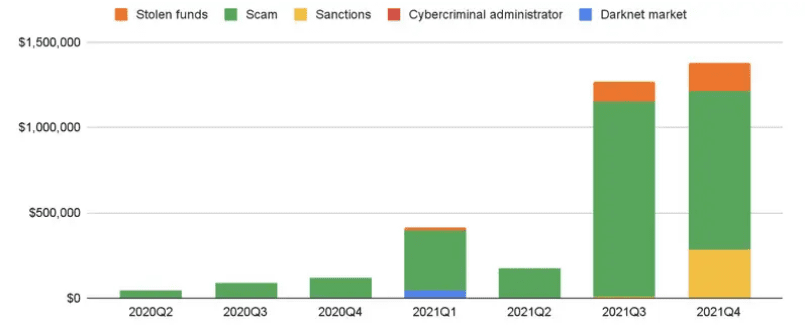The growth of NFTs have been a joy to watch. The willingness of many to pay millions of dollars for digital arts is a testament of what a world that continues to go digital could look like. Reports shows that NFT marketplaces and collections grew from $106 million in 2020 to $44.2 billion in 2021.
While the growth has been nothing short of phenomenal, NFT marketplaces have continuosly been the subject of unending attacks and hacks and claims that their platforms are the new frontier for money laundering.
Non-Fungible Thefts, A Glowing Review
In 2021, one of the most popular buzzwords in the crypto ecosystem was non-fungible token (NFT), with many news headlines describing NFT artists and investors making a fortune.
NFTs, or digital reproductions of artwork, sports cards, and other valuables linked to a blockchain, gained traction as Wall Street and Hollywood investors jump on board.
NFTs became a way for entertainment, cinema, and sports personalities to reach out to fans via their digital assets, in addition to monetary rewards. In India, when celebrities like Amitabh Bachchan and Salman Khan entered the realm of NFTs, their support boosted the popularity of the digital assets.
However, with this increased hype came an increase in crime.
Investment fraud involving stocks, bonds, and cryptocurrencies accounted for $285 million of all social media scams in 2021, according to the US Federal Trade Commission (FTC).
According to a report published earlier this month by Chainalysis, a blockchain research firm, washtrading and money laundering are two types of NFT-related crimes that exist in the Ethereum NFT ecosystem.
Last year, the NFT market skyrocketed in popularity. Chainalysis tracked $44.2 billion in crypto transmitted to NFT-related smart contracts in 2021, up from $106 million the previous year.
Crypto-enabled crime, such as ransomware attacks and scams, is growing in tandem with the crypto market. Criminals increasingly turned to new areas including decentralized finance (DeFi) platforms and NFTs in 2021, when crypto crime reached an all-time high of $14 billion.
Illicit value received by NFT platforms. Source: Chainalysis
In the third quarter of 2021, the value transacted on NFT marketplaces by unlawful addresses increased dramatically, surpassing $1 million in cryptocurrency, according to the Chainalysis report. Meanwhile, in the fourth quarter, the report observed around $284,000 worth of cryptocurrency transacted on NFT marketplaces from such addresses, with a total value of just under $1.4 million.
More Money, More Thefts
In principle, blockchain technology was meant to make it easier for digital artists to sell one-of-a-kind ownership tokens, providing customers with a permanent record of ownership.
Other artists, on the other hand, claim that the cryptocurrency explosion of the past year has been a nightmare. One of the issues is that anyone can “mint” a digital file as an NFT, regardless of whether or not they have rights to it, and the process is anonymous by default.
After NFTs based on stolen work by Qing Han, a beloved artist who died in 2020 after publicly detailing her struggle with cancer, were discovered for sale on OpenSea, DeviantArt, an online community for digital artists, began monitoring the blockchain for duplicates of their users’ work last fall.
Related article | NFTs In A Nutshell: A Weekly Review
Since then, DeviantArt has sent 90,000 fraud notifications to thousands of its users, according to business executives. It’s now screening 4 million new NFTs each week for fraud. From October to November, the number of alerts more than doubled, and from November to mid-December, it increased by 300 percent.

ETH/USDT trades at $2.6k. Source:TradingView
Based on images of her work for sale on an online auction platform, Aja Trier, a Texas-based artist, claims to have discovered 87,000 NFTs, many of which are priced at $9.88.
In a single night, 500 entries of her stolen work were posted, showing that the crime was automated and carried out by bots.
Just this Saturday, hundreds of NFTs were stolen from OpenSea users, prompting a late-night panic among the site’s large user base. According to a spreadsheet created by the blockchain security firm PeckShield, 254 tokens were taken during the attack, including tokens from Decentraland and Bored Ape Yacht Club, with the majority of the attacks occurring between 5 and 8 p.m. ET.
Why?
To begin with, NFTs are purchased on marketplaces using cryptocurrencies. Cryptocurrencies are frequently used for harmful purposes, such as concealing the source of criminal proceeds, and, despite the fact that transactions are traceable, more sophisticated criminal actors use a number of strategies to thwart law enforcement investigations.
Along with the hazards associated with cryptocurrency use, money launderers can profit from the trading and sale of NFTs in the same way they profit from the sale of actual art.
The digital nature of these tokens also opens the door to new risks. It is possible for creators to ‘hide’ information within an NFT during the creation process.
In addition, criminals can hack into NFT marketplace user accounts and transfer NFTs to their own accounts. The hacker can rapidly sell the stolen token(s) and attempt to launder the funds after transferring the NFTs.
Way Forward
The hazards of counterfeiting and theft of NFTs can also be reduced. Consumers should be able to use two-factor authentication, and cyber security measures should be in place to safeguard against opportunistic hackers, according to NFT markets. Aside from the importance of excellent cyber security, there is a lot to be learned from how the traditional art market is governed.
A registry of stolen or fraudulently obtained NFTs can also developed. This would be similar to the Art Loss Register, which lists stolen art and restricts its resale at reputable auction houses in the real world. Some of the biggest online auction houses for NFTs have already built areas within their platforms for tokens with verified creators.
NFTs are no exception to the rule that any type of economic value transfer can be used to perpetrate crimes. The fact that NFTs are being used for illicit purposes does not negate their potential as a tool for artists to gain recognition for their work or solve other economic issues. Marketplaces only need to take more stringent approach to protecting the asset class.
Related article | Melania Trump Sells Her Own NFT To — Guess Who? — Herself For $170K
Featured image from Shutter Stock, chart from TradingView.com


